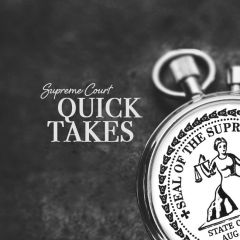ISBA Launches Quick Takes for Your Practice: COVID-19 Series
The ISBA has launched a new video series to help educate members affected by the COVID-19 pandemic.
The videos, which are available on YouTube and the ISBA’s COVID-19 resources page, provide practice information and tips from expert attorneys throughout the state. The videos focus on how to advise clients and meet their needs during this emergency.




